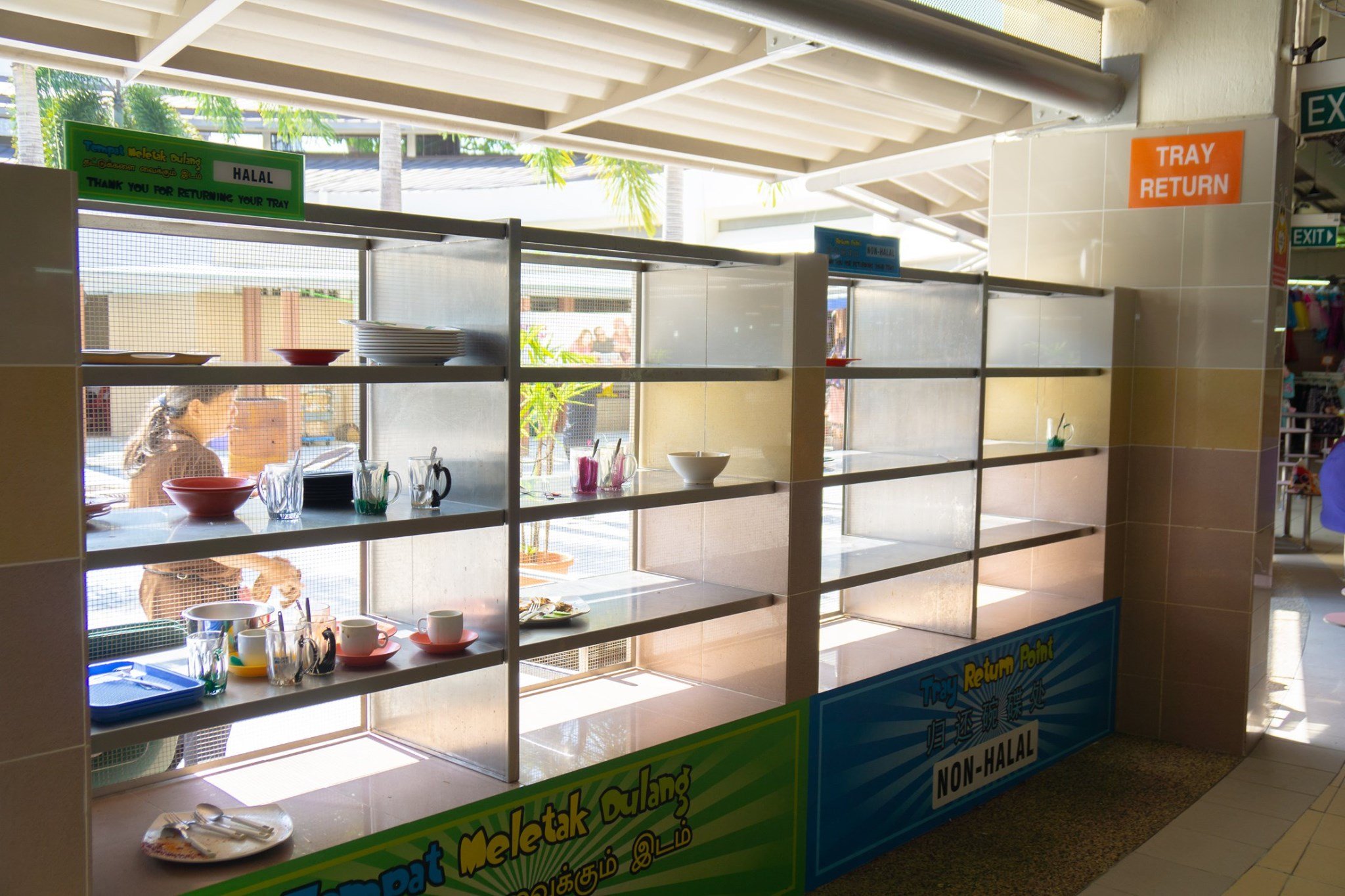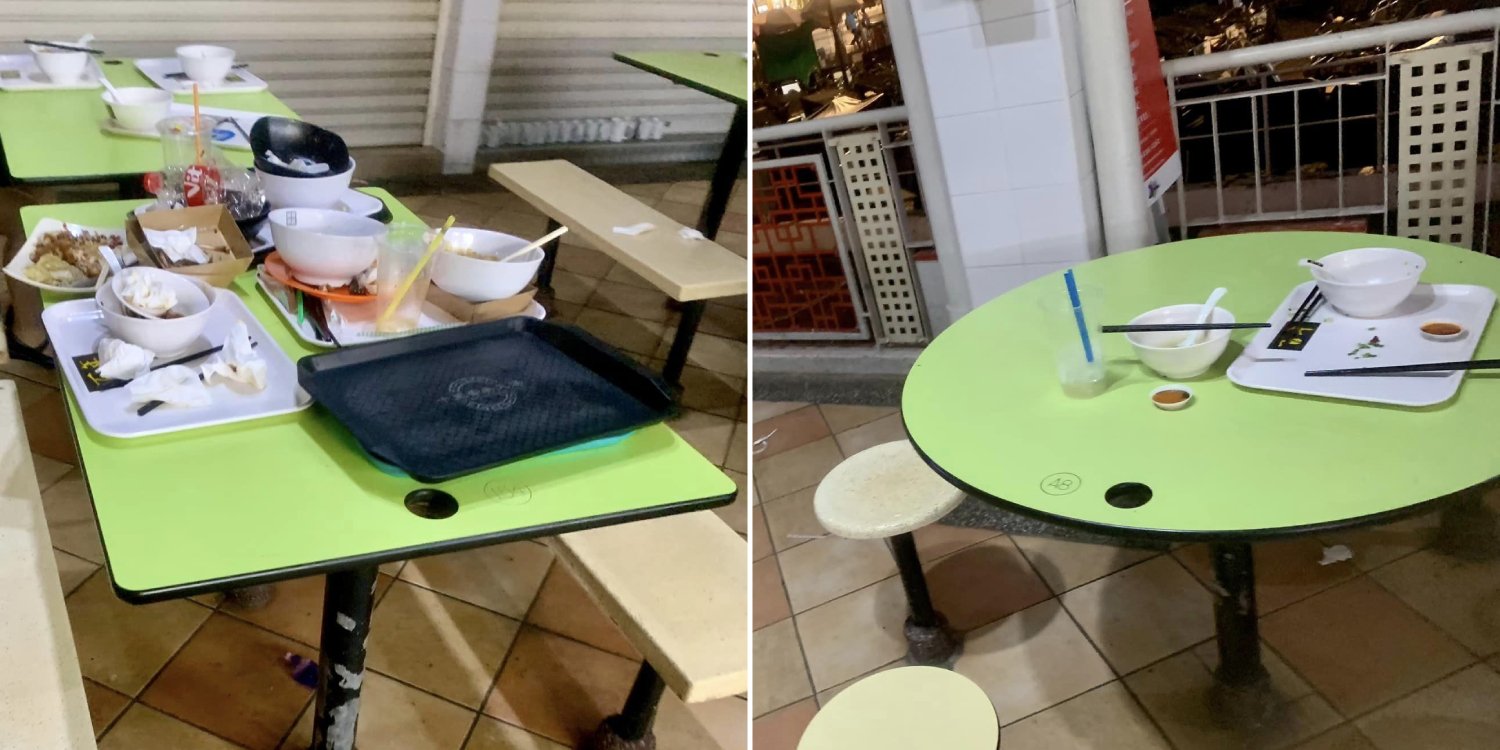Enforcement For Tray Returns Stepped Up From 1 June
The National Environment Agency (NEA) and Singapore Food Agency (SFA) are stepping up enforcement and taking a stricter stance regarding tray and crockery returns.
Starting Thursday (1 June), enforcement officers will take down the particulars of those who do not clear their tables after eating.
This was announced in a joint statement by both agencies on Wednesday (31 May).
First-time offenders will receive a warning in writing for their actions. Repeat offenders will get a fine or face charges in court.
Enforcement officers will now issue written warnings to first-time offenders
Since 2021, relevant authorities have maintained enforcement of tray and crockery returns at public eateries, such as hawker centres, coffee shops, and food courts.
Previously, all diners must clear trays and other litter on the table before leaving. Enforcement officers would advise those who do not clean up after themselves to do so.
Those who refuse would then be issued written warnings.
But now, stricter regulations mean that even first-time offenders will receive an official written warning.
The agencies will also deal with people who commit subsequent offences more stringently. These repeat offenders may get fined or even charged in court.
Q&A for tray return etiquette in hawker centres, food courts & coffee shops
NEA also appended a list of key questions and their answers, which you can find below.
1. Is it an offence if a diner clears his/her tray and used crockery, but leaves behind tissues or empty drink cans, or food remnants such as shells and bones on the dining table?
Yes, no one should leave behind any litter in any public place, except in a dustbin or other receptacle provided for the deposit of refuse and rubbish. This includes used tissues, wet wipes, drink cans, shells and bones. Diners can return their litter together with the used crockery at the tray and crockery return stations.
2. Are diners expected to remove trays, used crockery and litter left behind by the previous diner?
Cleaners will assist to remove trays, used crockery and litter left behind by the previous diner. We urge all diners to return their used trays and crockery, remove litter and keep the tables clean for the next diner.
3. Will NEA enforce against the elderly, the less-abled, or children under 12 years old for table littering?
Enforcement will not be taken against the frail elderly or less-abled, or children who are clearly unable to clear their tables.
These groups would typically be those who are unable to order and bring the food ordered to the tables on their own to begin with.
Family members or dining companions of these groups should help to dispose of the litter and return the trays and used crockery. Those able to bring the trays and food to the table on their own should likewise be able to return their trays and used crockery.

Source: Facebook
4. Will cleaners lose their jobs if diners clear the trays for them?
Cleaners are still required to maintain and upkeep the general cleanliness of dining places, including regularly wiping the tables, as well as clearing and sorting used crockery at the designated tray and crockery return points.
Returning one’s tray and used crockery will reduce the cleaners’ need to make frequent rounds to clear tables. They can instead focus on cleaning the tables, enabling faster turnover of tables during peak meal times. This benefits hawkers, diners and cleaners.
5. What if the cleaner insists on clearing the table for diners?
In such situations, diners are welcome to let the cleaners clear the table. Cleaning contractors and cleaners have been briefed on the ‘self-service concept’ and table-cleaning workflow. Hence, we urge diners to take the initiative in keeping their tables clean and returning trays and used crockery.
6. What if the enforcement officer requests for a diner’s particulars, but he/she does not have them on hand?
Various types of photo IDs are accepted for verification by the officer, including digital NRIC through the Singpass app. In the event that the offender does not possess any valid particulars on hand, the officer will seek the assistance of police officers to verify the identity of the offender.
7. What if a diner steps away from the table to get a drink with the intention of coming back to return his/her tray, but enforcement officers accuse him/her of littering?
If we assessed that the diner had indeed stepped away from the table to get a drink with the intention of coming back to return his/her tray, the officer will request that the diner clear the used tray/crockery before proceeding to buy the drink. No enforcement action will be taken against the diner.
8. What if diners are unable to return their tray as the tray return rack is full? Will enforcement be taken against them?
No enforcement will be taken against diners leaving the trays and crockery near the tray return station in such situations.
9. Will authorities take any action against operators who fail to ensure the maintenance of the Tray Return Racks?
Under the Environmental Sanitation Regime, Premises Managers need to coordinate housekeeping and cleanliness issues with stakeholders, including Hawkers’ Associations to ensure cleanliness outcomes for the entire centre are met.
This includes daily cleaning and disinfection of countertops/shelves of the tray return stations/racks, on top of prompt clearing of used trays/crockery and litter such as used tissues, wet wipes and food remnants by cleaners during the centres’ operations.
Tray return rates at 90% and above
Per the statement, the agencies started taking action against those who litter tables at hawker centres back in September 2021.
In January last year, they subsequently expanded this regulation to apply to coffee shops and food courts.
Since then, the average Tray and Crockery Return Rate (TCRR) at hawker centres has increased to 91%, said NEA and SFA. This is a significant increase from 65% in August 2021.
Similarly, the TCRR for coffee shops and food courts has maintained at 90% since December 2022.
“We thank everyone who has contributed to this movement and displayed social graciousness,” the statement said.
Public urged to cooperate with enforcement officers
NEA and SFA explained that the heightened enforcement ensures that the good efforts of the majority who follow the rules are not “marred” by the inconsiderate behaviour of the minority.
The agencies will continue to reach out to the public to remind everyone about the importance of keeping Singapore clean.
Should you be approached by enforcement officers, please be sure to cooperate with them.
As eateries such as hawker centres, coffee shops, and food courts are common spaces, let’s be considerate to others around us.
Have news you must share? Get in touch with us via email at news@mustsharenews.com.
Featured image adapted from Facebook.

Drop us your email so you won't miss the latest news.









